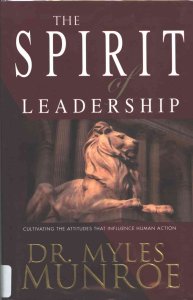 Myles Monroe, The
Spirit of Leadership: Cultivating the Attitudes that Influence Human Action
(New Kensington:
Whitaker, 2005). Hardback, 299
pages. Grade level 10.
Myles Monroe, The
Spirit of Leadership: Cultivating the Attitudes that Influence Human Action
(New Kensington:
Whitaker, 2005). Hardback, 299
pages. Grade level 10.
Regrettably this is not a recommend book. The author appears to be a successful
inspirational Christian speaker. However, if his words are followed, the
results will be disastrous for inexperienced leaders.
Munroe writes throughout the book that leadership, that
is, the “spirit of leadership,” is most importantly a mental attitude (p.
15). He presents an idealized view of
leadership, which is the ability to influence people through inspiration and
passion (p. 54). The Spirit of leadership is necessitated by self discovery (p. 216) and relies on
qualities received from God (Chapter 3, p. 81ff). Pages 79-80 present a list of aphorisms concerning
leadership:
1. True leadership is an attitude not a
title . . . .3. Leadership is not a pursuit but a result . . . 6. The source of inspiration
is passion. . . .10. Leaders are often ordinary people who accept or are placed in
extraordinary circumstances. . . . .15 True leaders discover keys to the nature of
leadership from the examples of others.
The book greatly suffers, however, from a shallow presentation
of leadership. While he holds that all
people are given leadership gifts from God (p. 13, p. 33) he often contends
that these leadership gifts do not need to be systematically developed. He insists that “leadership is one of
attitude not technique (p. 44).” Although
Dr. Munroe has a doctoral degree, his words seem encourage the reader to avoid
education! For instance, Dr. Munroe
reports that exceptional leader Bill Gates “didn’t do well under a traditional
education experience” but rather came about his success through purpose and
passion. This is a deceptive
characterization. It is true that Bill
Gates didn’t finish college, but after his private high school education he boasted
perfect SAT scores. He was a model
student at Lakeside in Seattle.
Leaders are both good and evil, but Dr. Munroe largely seems
to ignore this reality. Dr. Munroe’s
definition of true leadership does not take into account the success of leaders
such as Adolf Hitler. Evil leaders do not fit in his paradigm since he apparently ignores them altogether. Did these evil leaders misuse a gift from
God, was their passion misdirected, or did they rather manipulate people solely
through application of techniques? Monroe doesn't supply the answers.
A biblical viewpoint does not reconcile with
Munroe’s view of leadership. 2 Tim 2:15
commands the believer to diligent study of the Scriptures, Phil. 4:8 encourages
one to mediate on non-Scriptural disciplines of worth, and many verses in
Proverbs seem to conflict with his contention that passion alone is the key to
effective leadership. I hope that
Christian leaders will indeed rely on passion and self discovery but will add
to that diligent training that which implements the very best from sacred and secular
sources. Being “wise as a serpent”
(Matt.10:16) doesn’t just happen through motivation.
 Myles Monroe, The
Spirit of Leadership: Cultivating the Attitudes that Influence Human Action
(
Myles Monroe, The
Spirit of Leadership: Cultivating the Attitudes that Influence Human Action
( Myles Monroe, The
Spirit of Leadership: Cultivating the Attitudes that Influence Human Action
(
Myles Monroe, The
Spirit of Leadership: Cultivating the Attitudes that Influence Human Action
(